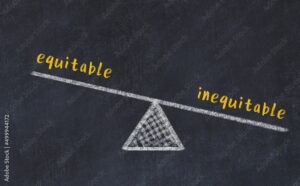“Hello friends! Welcome back to my blog. Today I’m sharing my thoughts on Debate 5: Has technology truly made our society more equitable?” 

Before this debate, I thought technology had already made our world more fair. I mean, I see people using phones to learn a language on YouTube, my cousin in India is taking an online university course from Canada, and I use Google Translate when I talk to families who don’t speak English. It looks so powerful! ![]()
But after listening to the debate videos (agree) and this one (disagree), reading all the articles, and reflecting on my own experiences as a teacher, my post-vote position is very different:
Technology is a tool with huge potential, but it hasn’t made society more equitable yet. In fact, many times, it makes the gap bigger. 
Why would some suggest “Yes”-
The agree side showed so many heartwarming examples.
I loved how they talked about AI and equity. Bernard Marr in Forbes explains how AI can make health care, education, and other services cheaper and more accessible. I could totally see this helping families in villages where my relatives live in Punjab.
Another article about digital inclusion even hits the right chord. Things like free public Wi‑Fi and training programs can help people who can’t afford expensive internet.
Agree team in debate also highlighted assistive technologies like speech-to-text tools and visual supports that help students with disabilities communicate and learn better. I have personally seen a shy student bloom when using a simple iPad voice app, it felt magical.
And the story about the #NeverAgain movement, where teenagers used social media to bring their voices to the world, is definitely a revolution.
Ofcourse, if I take into account all these examples then “Yes! Technology has made us more equal.”
But here when I consider What Happens in Real Life, it questions the notion.
I still remember during the COVID lockdowns, as a teacher, trying to reach students who had no internet at home. We delivered printed worksheets to some kids because video calls and online lessons were simply not possible. This wasn’t just my school, and it is supported through RAND research that during COVID only 30% of students in high-poverty schools had good home internet, while 83% in richer schools did.
So, technically, Technology helped the ones who already had it. Thus, bringing equity in question????
Disagree team brought in another article from Georgetown University, that said it clearly: 2.7 billion people are still offline. That number is huge! So while we celebrate AI and apps, almost one-third of the world isn’t even part of this conversation.
Even when there are programs like the Digital Equity Act funding in the US, the changes are slow. It takes years for infrastructure to reach rural or poor areas.
Technology Is Not Neutral
Another thing I never thought about before this debate is that technology can carry bias.
In the Nature research study, they explained how AI systems often reflect the inequalities of the data they’re trained on. If biased data goes in, biased results come out.
This simple picture shows how technology can become a ladder for some students but a wall for others. The gap between those who “have” and those who “don’t” is very real.
Even social media, which I love for its power to connect, can spread false information super fast. And the people with less digital literacy (often the same disadvantaged groups) are most vulnerable to these traps.
- Pre-vote: I was optimistic and voted “Yes, technology has made society more equitable.”
- Post-vote: After the debate, I changed to “No.”
Technology can make things fairer. But so far, the benefits have reached those who already have resources, skills, and access first.
Wrapping up my thoughts on the debate:
One thing is for sure: technology by itself doesn’t make society more equitable, it depends on how we guide and use it. What gives me hope is seeing organizations like UNESCO working with teachers around the world to teach responsible use of AI and digital tools. In fact, their short video “Guidance for Teachers on AI in Classrooms” shows exactly this as to how to make sure technology is used to empower students, close gaps, and build digital skills rather than widen divides.
So after this debate, my post-vote still stays on the “disagree” side. I don’t think technology automatically leads to an equitable society but with the right teaching, policies, and awareness, we can definitely make it a tool for equity rather than inequality.
I would love to hear your thoughts! What’s your take on this debate topic? Do you agree with my viewpoint, or would you want to add or change something based on your own experiences? Let’s keep the conversation going in the comments!


Thanks for sharing such a thoughtful and well-rounded post! I really appreciated how you walked through both perspectives before explaining how your thinking shifted.
This was actually my debate topic, and I argued on the disagreeing side, so I was especially interested in seeing how others interpreted the points. Like you, I believe technology can help make society more equitable, but right now, it often ends up benefiting those who already have access, skills, and support. That gap is still very real.
Your examples, especially the one about students during COVID, really resonated with me. I saw the same thing, some kids just couldn’t participate in online learning because of tech barriers, and it was heartbreaking.
The way you phrased it—technology as a ladder for some and a wall for others—really stuck with me too. That’s such a powerful image and exactly how I feel. So, even after all the discussion, I’d have to say I still stand with the disagree side as well. Tech has potential, but it’s not automatically equitable without intentional action.
Thanks again for your thoughtful reflection!
Hey Kritika! I enjoyed your post summarizing and reflecting on, in my opinion, the most challenging debate topic! I share your sentiment that technology has ultimately not led to an equitable society *yet*…yet being the key word here. Technology is incredible and has such potential to bridge gaps to increase inclusivity. Your examples of your cousin taking an online course in Canada and of you using translators to communicate with families display the powerful possibilities tech has…but there’s a lot of work to do to ensure tech isn’t doing more harm (furthering the digital divide and reinforcing societal inequities) than good.
Thanks for writing about technology’s inherent bias – that’s such a major point for the disagree team. Biases from tech use (social media, AI) are hard to recognize and can be damaging in perpetuating societal inequities in a ‘matter of fact’ way without tech consumers knowing they are consuming these biases! As you say, this leads to misinformation and is, thus, creating the opposite of an equitable society as dominant bias is going to be prominently found online.
Lots to think about this week. Thanks!
Teagan
Hi Kritika,
I appreciate your perspective. From my experience, especially working with rural communities, technology has been a game changer in bridging inequalities.
Before technology, rural areas faced extreme isolation, limited access to education, healthcare, and information. Many depended solely on local resources and word of mouth, which often perpetuated disadvantages. After technology arrived, mobile phones, internet access, and digital tools, people began accessing online education, telehealth, and market information that was previously unreachable. Farmers learned new techniques through YouTube, students joined virtual classrooms, and families connected with relatives abroad. These changes empowered individuals to shape better futures.
Regarding COVID-19, I agree the pandemic highlighted the digital divide, but simply citing it doesn’t capture the full picture. Even limited technology access during lockdowns was vital, some students could continue learning instead of losing an entire year. Technology provided hope and continuity when traditional methods failed.
While gaps remain, technology has fundamentally shifted society toward greater equity, especially for those historically marginalized. With improved infrastructure and digital literacy programs, I believe it will continue to level the playing field.
Sarada